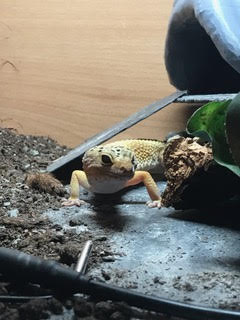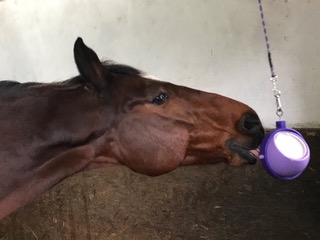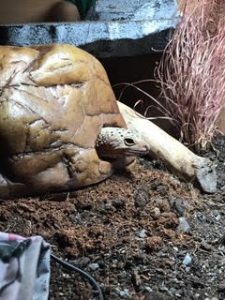Hello! I hope you’ve had a better few months than I have- not much has happened with the horses, I had COVID-19 in January (0/10 do not recommend) and then the vaccine a month later, plus its been so cold and wet its been hard to find motivation to do anything. Some
good news about shows starting up soon, let’s hope the EHV-1 virus doesn’t leave all the horses quarantined too!

So, what is enrichment? In this context, it is improving the quality or value of the life of animals in our care- something we have a moral obligation to do, in my opinion. Enrichment is not a particularly new concept in the care of any species of animal, and yet it is commonly overlooked- even now you see incredibly basic setups and activites for all animals, from hamsters to horses. One of my favourite accounts on tiktok is a wild cat sanctuary (@wildcatridgesanctuary) and several of their videos are dedicated to improving the lives of their captive cats via enrichment. This is usually sensory, with new or unusual smells and textures, or puzzles for the cats to solve for a reward (usually meat or catnip).
There are a lot of ways to improve the lives of all our pets- new and interesting smells, unusual textures, new foods, target/trick training (I’ve even seen someone target train a tortoise!), offering them choices and puzzles to solve, anything that makes their environment more interesting.
You might be seeing where I’m going now- we can improve the lives of our horses with enriching activities and new challenges. Horses often seek to do things that are interesting- Zavon seems to prefer more complicated exercises than simply going round in circles, they often seek to investigate new objects in their environment (even if it is very scary, as Zavon will inform me). Like humans, investigating their world is a natural instinct for horses of all ages. Allowing horses a wide variety of scents, foods (many equine behaviours demonstrate a good argument for the existence of zoopharmacognosy) and interactions can only be beneficial for their understanding of the world and their quality of life. Plus, horses that have been allowed to investigate and problem solve tend to be more self-confident, making them better partners and competitors.
But surely, they wouldn’t get such things in the wild? Shouldn’t we be striving to make their environment as close to wild as possible? Yes, but also no. The number one principle of advanced husbandry is to aim for an environment as close to natural as possible while being free from stresses of predators and illness. However, captive equines are increasingly different from their wild ancestors, and in the wild they would have a much larger range of choices than they do in captivity. Giving them unusual sensory inputs allows them to live a much richer and varied life.

Variety! Things such as varied foods (e.g., hand grazing and allowing them to pick at different (safe) flora), interesting smells and tastes (such as the wide range of likit flavours), trick training, puzzles (the Likit Snak-a-Ball not only provided enrichment but also encourages the horse to eat little and often benefitting their digestive system too) and anything else you can think of. Turnout in interesting paddocks is also so important, walking over a variety of gradients and surfaces is incredibly important for both metal and physical wellbeing. It is important to do these things safely, so using things that have been specifically designed for horses and wearing PPE such as a helmet and gloves are essential!
I’ve been seeking to enrich all my animals lives as much as possible recently, I tried some trick training with Zavon (not that he really understood it, it seems, he just enjoyed the pats (and likit snaks!) and have re-vamped my gecko’s vivarium a few times in order to get the most interesting arrangement possible. Our animals may not be our entire lives, but we are theirs.
I hope my late-night musings may have brought you some entertainment, or at least a different point of view. Hopefully by next month we can actually go and do things so this blog will be more like my usual style.
Stay safe and strive to give your animals the best life possible!
Best wishes
Cora, Zavon (and Mary, who’s currently still on holiday)


